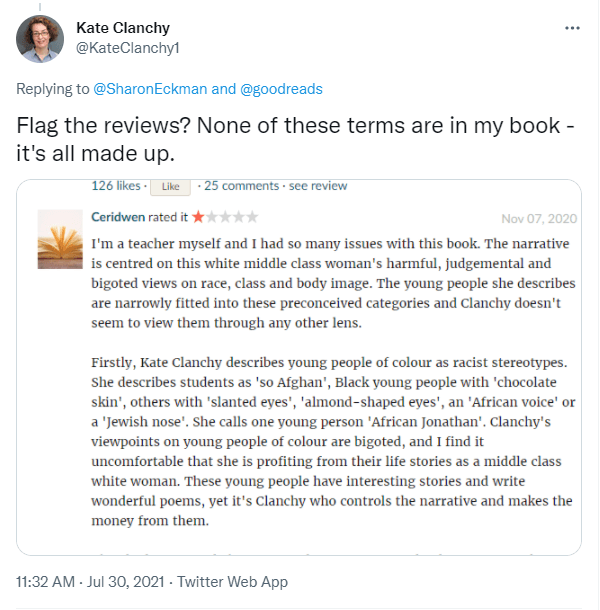Kate Clanchy’s memoir Some Kids I Taught and What They Taught Me is an award-winning book that has received rave reviews, New Statesman called it refreshing, The Guardian thought that people like Clanchy are needed to keep liberal ideals alive, The Times called it inspiring and uplifting, The Sunday Times deemed it inspiring, moving and funny.
Philip Pullman said that it is: The best book on teachers and children and writing that I’ve ever read. No-one has said better so much of what so badly needs saying. I want to see this book become a bestseller, I want to see it in every staffroom, I want to see it read by every student teacher. This is a wonderful achievement.
In 2020 Some Kids I Taught and What They Taught Me won the 2020 Orwell Prize for Political Writing
Then in 2021 on twitter Kate Clanchy alleged that Goodreads reviewer Ceridwen had made-up quotes from her book in their review.

Things went downhill rapidly from there!
Unfortunately, whenever people have received near universal acclaim & praise for their work they can react poorly when they encounter someone who says “whoa there is a problem here” and this is exactly what happened!
Instead of giving a blow by blow account what occurred, I will recommend that you read Beth Bhargava’s comprehensive write-up of what happened over at Bad Form Review here. I will just say that I was bitterly disappointed by a number of authors whose work I have previously enjoyed.
Like Public Libraries, Publishing is a majority white profession, both of which can be difficult to break in to, as many opening positions are notoriously low-paid. I could not help but compare what is happening with Kate Clanchy’s book with what happened with the CILIP Carnegie & Kate Greenaway Medals in 2017 where it took people of colour to start asking why no-one who was not white had won either of the awards in over 80 years and a big push from them and allies to start the process to effect change.
Kate Clanchy issued a statement on August 6th which caused more consternation and upset. Picador, KC’s publisher released three statements on the 6th, 9th and 11th, The Orwell Foundation issued a brief statement denying responsibility of what their external judges did, and Philip Pullman released an ‘apology’ on the 10th.
No mention was made by anyone at the centre about the vile language and threats directed against Professor Sunny Singh, Chimene Suleyman & Monisha Rajesh three of the highest profile people that stepped up to offer honest critiques of Clanchy’s work and challenge the racist rhetoric that was springing up in the discussion.
The end result of the storm of protest is that Kate Clanchy will rewrite portions of her work to remove the racist and ableist stereotypes contained in the original.
Systemic racism does not require that those working within the system to be racist; in publishing like libraries, is made up mostly of good, well-intentioned (white) people who do their best but miss many signs that what they are working on may be harmful to minority groups. Unfortunately, most white people lack the insights and cultural knowledge to identify problematic work and content. Even after an outcry those who ‘have learned’ from the criticism are often rewarded, while still excluding those that were harmed.
It should not fall to People of Colour to fight for systemic change on their own, no matter where it happens – in libraries, in publishing, or elsewhere if someone says that something is harming them and their community we need to stand with them and fight to make a meaningful change.
We (white people) have benefitted from systemic racism for hundreds of years, we are complicit even when we fight against it, and we should fight against it – we lose nothing if those that are disadvantaged gain the privileges that we currently enjoy.
It is often said that When you’re accustomed to privilege, equality feels like oppression, but this is something we need to stamp out of our psyches and instead embrace the need for true equality.